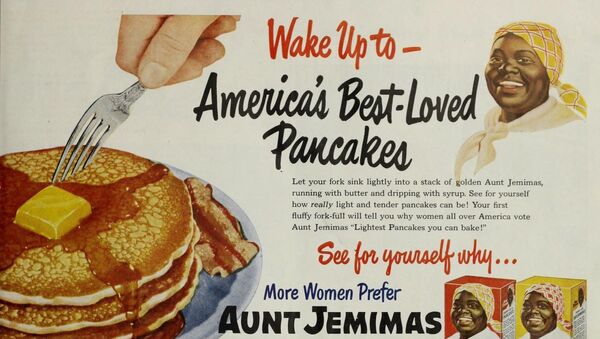“Aunt Jemima was canceled. And if you didn’t know, Nancy Green, the original first Aunt Jemima, she was a picture of the American Dream,” she asserted on June 23 during a Turning Point Action “Address to Young Americans” with US President Donald Trump, speaking of Quaker Oats’ recent decision to rebrand the pancake mix and syrup.
“Aunt Jemima was canceled… She was the picture of the American dream. She was a freed slave who went on to be the face of the pancake syrup." -- A student at Trump’s event on Tuesday pic.twitter.com/jgONhiXiza
— Peter Wade 🤦♂️ (@brooklynmutt) June 24, 2020
“She was a freed slave who went on to be the face of the pancake syrup that we love and have in our pantries today. She fought for equality. And now the leftist mob is trying to erase her legacy,” Escudé added.
“And might I mentioned [sic] how privileged we are as a nation if our biggest concern is a bottle of pancake syrup.”
Escudé, who was recently fired from a job over her comments labeling Black Lives Matter a non-Christian movement, was correct in her identification of Green as the first Aunt Jemima. At the same time, the student appeared to conflate the character played by Green with an accurate representation of the formerly enslaved woman.
The brand launched in 1889 and quickly began depicting Aunt Jemima as a mammy caricature of enslaved Black women who would serve white Americans. Many netizens decided to remind the Turning Point ambassador of what she appeared to leave out of her speech.
Ummm...Aunt Jemima was a fictional character first created for a minstrel show by Chris Rutt, a popular racist from the late 19th Century who danced and sang in black face.
— Kurt Eichenwald (@kurteichenwald) June 24, 2020
Do ANY conservatives/Trumpers know ANYTHING about the topics they whine about? https://t.co/tOejFuZo4M
she received a medal and certificate from the Expo officials.After the Expo, Green was offered a lifetime contract to adopt the Aunt Jemima moniker and promote the pancake mix. This marked the beginning of a major promotional push by the company pic.twitter.com/jNMeATOm4n
— lil lex💕 (@lexikennedy35) June 16, 2020
3. Rutt was right. Aunt Jemima appealed to White folks esp because of her depiction of a Mammy. She was Mammy incarnate and represented culinary expertise via a product so easy to make that it was almost as if White folks had a Black servant doing it for them. Ad is from 1897. pic.twitter.com/LWsPddeSjn
— Brian Behnken (@HistoryBrian) June 17, 2020
They want to keep the racist stereotype of a fictional Aunt Jemima on the pancake syrup but they don't want put real life freedom fighter Harriet Tubman on the $20 bill. https://t.co/M7tRpzjMlz
— Keith Boykin (@keithboykin) June 24, 2020
Aunt Jemima & Uncle Ben were the dreams of American white supremacy - Black people ready to serve the masters. https://t.co/PXDzm9KVkP
— Carl Dix (@Carl_Dix) June 24, 2020
Other netizens offered to provide some context for those confused on why such caricatures have always been offensive to Black Americans.
It’s not that Aunt Jemima was a symbol of a racist past, she was the very embodiment of a racist past. She will not be missed by anyone who knew that. pic.twitter.com/7F3yx62oYX
— Neil deGrasse Tyson (@neiltyson) June 17, 2020
It’s YEARS of the blatant disregard coupled with the near-sudden “change of heart” that irks me.
— Justice for #BreonnaTaylor (@TrulyTafakari) June 23, 2020
1) The Mammy: A Black woman whose purpose and life circled around taking care of the white man and his family. Almost ALWAYS desexualized and complacent with not being free.
— Jennifer Nicole (@FitandFiner_) June 17, 2020
Threw some modern day depictions in here for y’all too. pic.twitter.com/5nnFweMRCF
The depictions of Aunt Jemima have changed over the past decades. According to CBS Dallas-Fort Worth, Texas resident Lillian Richard was the face of the pancake mix and syrup brand from 1925 to 1940.
However, the Aunt Jemima most modern-day Americans grew up with has pearl earrings, meticulously curled hair and is believed to be modeled after Anna Short Harrington.
Harrington’s family has expressed their own displeasure with the announced rebranding of the pancake mix and syrup.
"This is an injustice for me and my family. This is part of my history, sir," Larnell Evans Sr., the great-grandson of Harrington, told Patch. "The racism they talk about, using images from slavery, that comes from the other side — white people. This company profits off images of our slavery. And their answer is to erase my great-grandmother's history. A Black female. … It hurts."
Vera Harris, identified as the family historian for the Richard family, expressed similar thoughts to Texas outlet KLTV.
“A lot of people want it removed. We want the world to know that our cousin Lillian was one of the Aunt Jemimas, and she made an honest living,” she said. “We would ask that you reconsider just wiping all that away. There wasn’t [sic] a lot of jobs, especially for Black women back in that time.”


